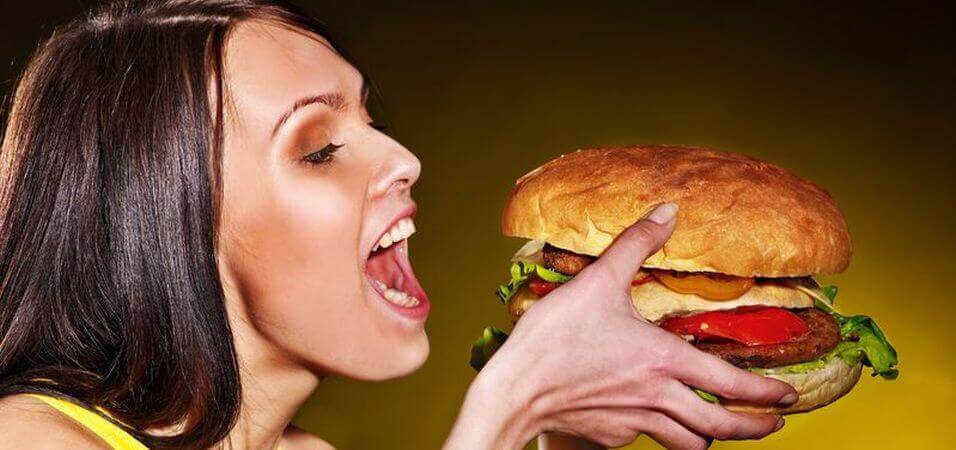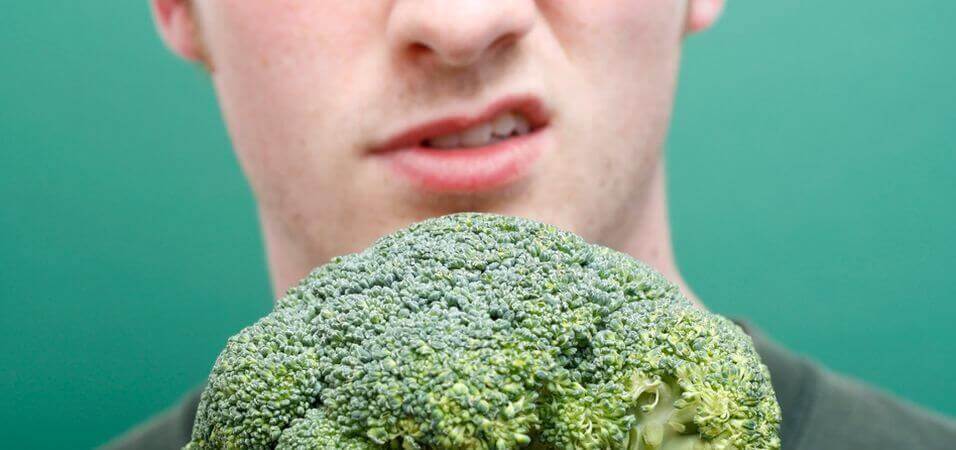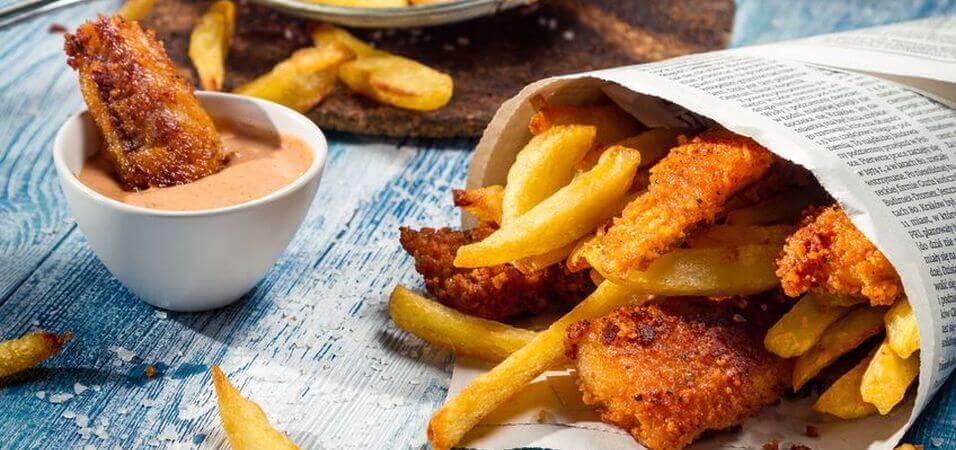Why do food cravings strike when you least want them?
You know…you’re at work and locked in the conference room when you remember the cake down the hall. Minutes turn to hours as you fixate on that chocolatey goodness.
Or you’ve just crawled into bed, only to find yourself overwhelmed by a hankering for the cold pizza languishing in the fridge (it would be so much happier in your belly!).
Or your meal plan’s archenemy: the midday slump, where your brain refuses to work for anything but carbs and sugar.
Sigh. If only we craved chicken breasts and vegetables…hitting our macros would be so easy…
Well, that may be wishful thinking, but that doesn’t mean you have to be a slave to your food cravings and abandon your quest for the ideal body.
The reality is cravings aren’t nearly as vexing when you know why they occur and how to manage them, which is what this article is going to be all about.
Let’s begin.
- What Are Food Cravings?
- What Causes Food Cravings?
- What Types of Food Do People Crave and Why?
- The Skinny on Food Cravings and Weight
- How to Beat Food Cravings
- The Bottom Line on Food Cravings
Table of Contents
+Want to listen to more stuff like this? Check out my podcast!
What Are Food Cravings?

According to the good people over at Merriam-Webster, a craving is “a very strong desire for something.”
That doesn’t quite capture the real flavor of the food craving, though. This does, though: “an intense, urgent, or abnormal desire or longing.”
“Urgent” and “abnormal” are the keys to understanding the difference between a craving and genuine hunger.
While hunger is “a very great need for food” of any kind, a craving is the desire for a specific food.
It’s a classic case of needs versus wants.
Fortunately, you don’t beat food cravings by ignoring hunger and starving yourself.In fact, you’ll want to go in the opposite direction (but more on that later).
So, to recap, if you’re wondering whether last night’s cheesecake binge was a result of hunger or just a craving, here’s what you need to consider:
- Specificity
When you’re hungry, you just want food in general because your body needs calories to keep soldiering on.
When you have a craving, though, it’s usually for one specific food (or type or taste, like carbs or sweet or salty fare).
- Intensity
If the urge to eat comes on fast and furious, it’s likely a craving.
- External
Food cravings are often a form of external eating, meaning they’re often triggered by external cues like seeing or smelling delicious goodies.
Internal eating, on the other hand, is a response to your body’s natural feelings of hunger.
What Causes Food Cravings?
Cravings are complex and intertwined with a number of internal and external cues.
Fortunately, a high-level overview of some of the more common causes can help us overcome our desire to eat away all our gains.
Let’s review the ones that give most people the most trouble.
How Alcohol Can Cause Food Cravings
If you’ve ever come back from the bar and polished off a bag (or two…or few) of chips, you already know about the link between alcohol and food cravings.
This relationship goes deeper than many people think, though.
Research shows that people who tend to experience strong food cravings also have an increased risk of alcohol abuse.
And as drinking is known to increase the likelihood of overeating (and enhance fat storage), a slippery slope comes into view:
Food cravings lead to overeating and drinking, which leads to more overeating and drinking, which can result in rapid fat gain.
We also know that people with a family history of alcohol dependence show a preference for sweeter foods, suggesting a genetic basis for the connection between alcohol abuse and food cravings.
The bottom line is this:
If you tend to overdo it on alcohol, you’re likely prone to cravings and overeating as well (and vice versa).
Keep that in the back of your mind next time you’re out for drinks. Click here to read about a strategy that will help you gain minimal fat while drinking.
How Restrictive Eating Can Cause Food Cravings

Have you ever become fixated on a food as soon as some “guru” labeled it “bad”?
Or maybe you wake up on the first day of a new diet and suddenly you just have to scarf down some donuts for breakfast.
Well, us quirky humans love to obsess over whatever is forbidden, and this is probably why restrictive eating is a known cause of food cravings.
There’s nothing like the temptation of a “taboo” food to trigger an obsession with it.
This is why so many mainstream diets lead to flame-out bingeing: they focus far too much on what you “should” and “shouldn’t” eat, and far too little on the scientific underpinnings like energy and macronutrient balance.
This is why you need to embrace flexible dieting and never look back.
How Emotional Triggers Can Cause Food Cravings
Quick: what does popular culture say women love to do when they feel down?
Eat their way through a pint of Ben & Jerry’s, of course.
And although that stereotype is a bit overplayed, it highlights a legitimate cause of food cravings.
Emotions can make you want to eat, and negative ones more so than positive.
Anger, sadness, and boredom have all been identified as reliable triggers for food cravings, possibly as a way of self-medicating to increase brain serotonin levels.
There are other ways to deal with negative feelings, though.
Exercising is always a good solution — I guarantee you won’t be thinking about cookies if you’re trying to hit a PR — but even something as simple as a stimulating game or walk outside can be enough to unfix your mind.
How Stress Can Cause Food Cravings
This one doesn’t come as a surprise to most of us.
Who hasn’t turned to sweet, succulent foods to take the edge off a rough day?
Well, while acute stress can suppress the appetite, the chronic variety has been linked to food cravings.
You see, in times of stress, your body copes in various ways.
One mechanism is activation of the hypothalamic–pituitary–adrenal axis (HPA) axis, which is a complex set of interactions between three glands: the hypothalamus, pituitary gland, and adrenal glands.
When this system is activated, cortisol levels increase, and this, in turn, increases the desire to eat.
This is why stress management is essential for taming cravings and achieving steady, predictable weight loss.
How Hormones Can Cause Food Cravings
Cortisol isn’t the only hormone that can trigger cravings.
For women, both pregnancy and the menstrual cycle have been identified as reliable stimuli.
As a whole, young women tend to experience the strongest food cravings, which suggests that cravings decline with the effects of ovarian hormones.
What Types of Food Do People Crave and Why?

Now that you understand a bit more about what causes cravings, let’s take a look at what people crave and why.
In general, the strongest cravings are for low-satiety (unfilling) foods.
That is, foods that are high in calories but low in protein and fiber. They’re also usually higher in fat and carbohydrates than average foods.
Basically, it’s the typical types of junk food that everyone knows and loves:
- Chocolate
- Salty snacks (chips, French fries, nachos)
- Ice cream
- Brownies, cookies, cakes, and muffins
- Bread and pasta
What is it about this stuff that revs up our salivary glands, though?
Well, research suggests it relates to what they call the food reward, which can be defined as “the momentary value of a food to the individual at the time of ingestion.”
In other words, these high-calorie, rather unfilling foods evoke powerful positive feelings for several reasons:
- The combination of fats and carbs causes the greatest sensation of reward (especially when compared to foods containing primarily one nutrient).
- Calorie-dense foods are frequently eaten at times of extreme hunger, which associates them with the satisfaction of hunger relief.
- Low-fiber foods are easily digested and lead to a faster spike in blood sugar and energy.
Basically, these high-calorie, carb and fat-laden foods don’t offer much in the way of nutrition, but they’re fantastic sources of instant gratification.
Before we move on, let’s take a quick detour to discuss the most commonly craved food of all: chocolate.
Why Do So Many People Crave Chocolate?
Chocolate is the most commonly craved food and it certainly meets all of the above criteria.
What makes chocolate so irresistible, though? Why do some people consider themselves “chocoholics”?
Well, while there may or may not be such a thing as “chocolate addition,” there’s no doubt that it can positively influence mood.
There’s nothing particularly special in play here.
Chocolate is just another way to get an energy and mood boost when you’re angry, bored, depressed, or tired.
The Skinny on Food Cravings and Weight
We all joke about our occasional overwhelming desire to eat like it’s our last day on Earth, but for many, food cravings are no laughing matter.
They’re more than just a mental distraction — they can make weight maintenance a truly daunting task and lead to long-term health problems.
You see, because people tend to crave foods that are high in fat, carbs, and calories, food cravings are naturally associated with weight gain.
This, then, often leads to a pattern of yo-yo dieting, which is itself a source of recurring stress and discomfort that increases the desire to overeat, creating a vicious cycle that can be incredibly hard to escape.
The relationship between food cravings and weight loss (or dieting for weight loss), however, isn’t as clear cut.
Food cravings are frequently cited as the most common reason to stray from a diet, but research shows that restricting calories for weight loss can cause a reduction of food cravings.
If you’re a well-traveled fitness junkie, you’ve probably already experienced this (and especially if you know how to cut fat the right way).
You start your cut and it’s touch-and-go for the first week or so, but after that, the game of Hungry Hungry Hippo going on in your brain finally winds down and it’s more or less smooth sailing from there on out.
How to Beat Food Cravings

As you can see, food cravings are a ticklish subject.
There are a lot of mental and physiological mechanisms in play and it’s quite hard to tease everything out for easy inspection and manipulation.
Fortunately, we don’t need to have the whole bit taped to know how to prevent cravings from keeping you fat and unhappy.
Here’s how it breaks down…
How to Use Your Diet to Help Beat Food Cravings
Generally speaking, the more rigid your diet is, the more you’re going to battle with food cravings.
For example, research shows that strict dieting strategies (that revolve around limiting the foods that you can eat), are associated with eating disorder symptoms and higher BMIs, whereas flexible dieting strategies are not.
They’re also known to be major triggers for food cravings.
So if you’re prone to cravings, the worst thing you can do is follow a diet that makes forbids certain foods.
Instead, use the principles of flexible dieting to create meal plans that you actually enjoy, and learn how to incorporate “cheat meals” without undoing all your hard work in the gym.
This way you can eat more or less all the foods you like (just in moderation) while still reaching your body composition goals.
The restrictive eating problem extends beyond food choices, too. It also includes eating too few calories.
If you eat too little, you can rest assured you’re going to be plagued by hunger and cravings.
That’s why it’s important to be aggressive but not reckless with your caloric restriction and get your macros right. Check out this article to learn how to do that.
How to Use Your Mindset to Help Beat Cravings
If you can use your mind to get stronger and better at sports, then you should be able use it to blunt cravings, right?
Absolutely.
If you level up your mental game, you can help keep your food cravings under control.
Mental Imagery and Cravings
Many food cravings begin with sensory exposure to a particular food.
You know, you’re driving along, minding your business, and suddenly your car smells like a giant french fry. And then you see it: the golden arches and poster of the golden, deep-fried goodies.
Juices begin to pool in your mouth as you imagine digging into an overflowing carton of nibblies…an image that you now can’t get out of your mind. (And the more vivid this imagery is, the stronger the craving is likely to feel, by the way).
Well, you can turn that same mental machinery against cravings to turn them off (or down, at least), and it’s very simple:
When a craving strikes, find something else to visualize vividly instead of that one food.
Really experience it with your mind’s eye — the colors, smells, sounds, emotion, tactile feedback. If you can hold this creation in mind for several minutes, you should find the craving far less compelling.
Another simple option is picking up your phone and playing a visually stimulating game for a few minutes.
Yup, even Tetris can block cravings.
Mindfulness and Cravings
Mindfulness, as defined by Kabat-Zinn, is “awareness that arises through paying attention, on purpose, in the present moment, non-judgmentally.”
Research shows that it can help your dieting experience in several ways:
- Lower levels of food cravings
- Reduced focus on “good” vs “bad” foods
- Improved body satisfaction
- Less emotional and external eating
There are several ways to incorporate mindfulness into your diet regimen.
Some people find meditation helpful (it was never my thing), and there are plenty of websites and smartphone apps that will guide you there.
“Mindful eating” techniques can help, too, and they’re quite simple.
For example, when you eat, slow down and be more aware of the physical sensations and your own thoughts and feelings about what you’re eating or just food in general. The idea is to focus on the whole experience of eating.
It’s also important that you discredit any bits of guilt or self-judgment that pop up. Simply be aware of and acknowledge what you’re thinking and feeling and “keep calm and carry on.”
I know this sounds kind of woo-woo, but make a habit of it and, in time, you should find yourself in more and more in tune with and in control of your cravings.
The Bottom Line on Food Cravings

If you’re going to get the body you really want — and keep it that way for the rest of your life — then you’re going to need to get a handle on food cravings.
And the best way to do that is…
- Limit your alcohol intake.
- Ditch restrictive diets and embrace flexible dieting instead.
- Eat plenty of high-protein and high-fiber foods.
- Turn to more positive ways to cope with bad emotions.
- Create a personal relaxation routine.
- Use mental imagery and mindfulness as needed.
Also, remember that food cravings don’t reflect anything about you as a person. We all have to deal with cravings to one degree or another, so there’s nothing to be guilty or ashamed about.
Happy dieting!
What’s your take on food cravings? Have anything else to share? Let me know in the comments below!
Scientific References +
- Alberts, H. J. E. M., Thewissen, R., & Raes, L. (2012). Dealing with problematic eating behaviour. The effects of a mindfulness-based intervention on eating behaviour, food cravings, dichotomous thinking and body image concern. Appetite, 58(3), 847–851. https://doi.org/10.1016/j.appet.2012.01.009
- Skorka-Brown, J., Andrade, J., Whalley, B., & May, J. (2015). Playing Tetris decreases drug and other cravings in real world settings. Addictive Behaviors, 51, 165–170. https://doi.org/10.1016/j.addbeh.2015.07.020
- Kemps, E., & Tiggemann, M. (2010). A Cognitive Experimental Approach to Understanding and Reducing Food Cravings. Current Directions in Psychological Science, 19(2), 86–90. https://doi.org/10.1177/0963721410364494
- Cornell, C. E., Rodin, J., & Weingarten, H. (1989). Stimulus-induced eating when satiated. Physiology and Behavior, 45(4), 695–704. https://doi.org/10.1016/0031-9384(89)90281-3
- Meule, A., Westenhöfer, J., & Kübler, A. (2011). Food cravings mediate the relationship between rigid, but not flexible control of eating behavior and dieting success. Appetite, 57(3), 582–584. https://doi.org/10.1016/j.appet.2011.07.013
- Batra, P., Das, S. K., Salinardi, T., Robinson, L., Saltzman, E., Scott, T., Pittas, A. G., & Roberts, S. B. (2013). Relationship of cravings with weight loss and hunger. Results from a 6month worksite weight loss intervention. Appetite, 69, 1–7. https://doi.org/10.1016/j.appet.2013.05.002
- Hall, D. M., & Most, M. M. (2005). Dietary adherence in well-controlled feeding studies. Journal of the American Dietetic Association, 105(8), 1285–1288. https://doi.org/10.1016/j.jada.2005.05.009
- Fabbricatore, M., Imperatori, C., Contardi, A., Tamburello, A., & Innamorati, M. (2013). Food craving is associated with multiple weight loss attempts. Mediterranean Journal of Nutrition and Metabolism, 6(1), 79–83. https://doi.org/10.1007/s12349-012-0115-x
- Rogers, P. J., & Smit, H. J. (2000). Food craving and food “addiction”: A critical review of the evidence from a biopsychosocial perspective. Pharmacology Biochemistry and Behavior, 66(1), 3–14. https://doi.org/10.1016/S0091-3057(00)00197-0
- Hetherington, M. M., & Macdiarmid, J. I. (1993). “Chocolate Addiction”: a Preliminary Study of its Description and its Relationship to Problem Eating. In Appetite (Vol. 21, Issue 3, pp. 233–246). Appetite. https://doi.org/10.1006/appe.1993.1042
- Gilhooly, C. H., Das, S. K., Golden, J. K., McCrory, M. A., Dallal, G. E., Saltzman, E., Kramer, F. M., & Roberts, S. B. (2007). Food cravings and energy regulation: The characteristics of craved foods and their relationship with eating behaviors and weight change during 6 months of dietary energy restriction. International Journal of Obesity, 31(12), 1849–1858. https://doi.org/10.1038/sj.ijo.0803672
- Rogers, P. J., & Hardman, C. A. (2015). Food reward. What it is and how to measure it. Appetite, 90, 1–15. https://doi.org/10.1016/j.appet.2015.02.032
- Gilhooly, C. H., Das, S. K., Golden, J. K., McCrory, M. A., Dallal, G. E., Saltzman, E., Kramer, F. M., & Roberts, S. B. (2007). Food cravings and energy regulation: The characteristics of craved foods and their relationship with eating behaviors and weight change during 6 months of dietary energy restriction. International Journal of Obesity, 31(12), 1849–1858. https://doi.org/10.1038/sj.ijo.0803672
- Pelchat, M. L. (1997). Food cravings in young and elderly adults. Appetite, 28(2), 103–113. https://doi.org/10.1006/appe.1996.0063
- Chao, A., Grilo, C. M., White, M. A., & Sinha, R. (2015). Food cravings mediate the relationship between chronic stress and body mass index. Journal of Health Psychology, 20(6), 721–729. https://doi.org/10.1177/1359105315573448
- Skorka-Brown, J., Andrade, J., & May, J. (2014). Playing “Tetris” reduces the strength, frequency and vividness of naturally occurring cravings. Appetite, 76, 161–165. https://doi.org/10.1016/j.appet.2014.01.073
- Dilorenzo, T. M., Bargman, E. P., Stucky-Ropp, R., Brassington, G. S., Frensch, P. A., & LaFontaine, T. (1999). Long-term effects of aerobic exercise on psychological outcomes. Preventive Medicine, 28(1), 75–85. https://doi.org/10.1006/pmed.1998.0385
- Nijs, I. M. T., Franken, I. H. A., & Muris, P. (2007). The modified Trait and State Food-Cravings Questionnaires: Development and validation of a general index of food craving. Appetite, 49(1), 38–46. https://doi.org/10.1016/j.appet.2006.11.001
- Alberts, H. J. E. M., Thewissen, R., & Raes, L. (2012). Dealing with problematic eating behaviour. The effects of a mindfulness-based intervention on eating behaviour, food cravings, dichotomous thinking and body image concern. Appetite, 58(3), 847–851. https://doi.org/10.1016/j.appet.2012.01.009
- Yeomans, M. R. (2004). Effects of alcohol on food and energy intake in human subjects: evidence for passive and active over-consumption of energy. British Journal of Nutrition, 92(S1), S31–S34. https://doi.org/10.1079/bjn20041139
- Schüz, B., Schüz, N., & Ferguson, S. G. (2015). It’s the power of food: Individual differences in food cue responsiveness and snacking in everyday life. International Journal of Behavioral Nutrition and Physical Activity, 12(1). https://doi.org/10.1186/s12966-015-0312-3
- Alberts, H. J. E. M., Thewissen, R., & Raes, L. (2012). Dealing with problematic eating behaviour. The effects of a mindfulness-based intervention on eating behaviour, food cravings, dichotomous thinking and body image concern. Appetite, 58(3), 847–851. https://doi.org/10.1016/j.appet.2012.01.009
- Gilhooly, C. H., Das, S. K., Golden, J. K., McCrory, M. A., Dallal, G. E., Saltzman, E., Kramer, F. M., & Roberts, S. B. (2007). Food cravings and energy regulation: The characteristics of craved foods and their relationship with eating behaviors and weight change during 6 months of dietary energy restriction. International Journal of Obesity, 31(12), 1849–1858. https://doi.org/10.1038/sj.ijo.0803672
- Nijs, I. M. T., Franken, I. H. A., & Muris, P. (2007). The modified Trait and State Food-Cravings Questionnaires: Development and validation of a general index of food craving. Appetite, 49(1), 38–46. https://doi.org/10.1016/j.appet.2006.11.001
- Paddon-Jones, D., & Rasmussen, B. B. (2009). Dietary protein recommendations and the prevention of sarcopenia. In Current Opinion in Clinical Nutrition and Metabolic Care (Vol. 12, Issue 1, pp. 86–90). Curr Opin Clin Nutr Metab Care. https://doi.org/10.1097/MCO.0b013e32831cef8b










